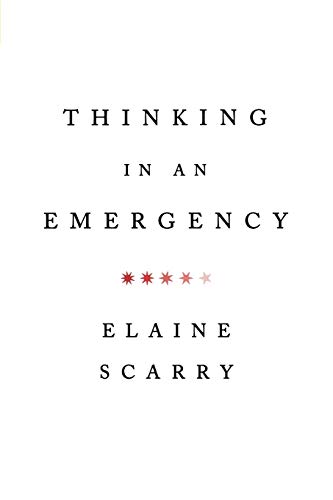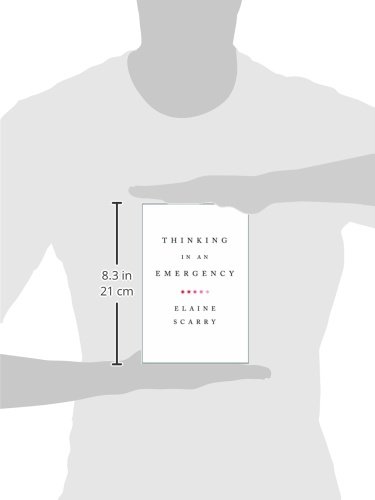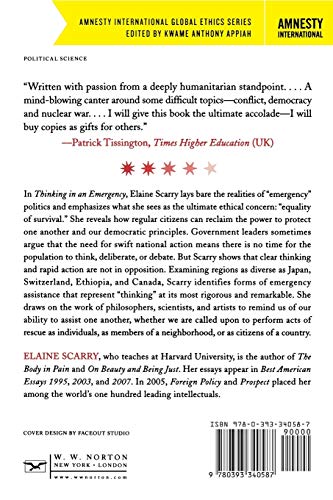Customer Services
Copyright © 2025 Desertcart Holdings Limited
Desert Online General Trading LLC
Dubai, United Arab Emirates




Full description not available
P**A
Surprising book; It may change how you view our world today
I purchased this book thinking that it would provide insight into how decisions are made in emergency situations. It does do that, to a certain extent, but the main thesis of the book is actually quite different than the title alone might suggest.This book is focused on is explaining how modern societies, in particular the eight nuclear weapons states (the U.S. plus seven others) have come to live in a state of "chronic emergency", and "with more and more powers ceded to the countries president or prime minister", rather than being decided through deliberation involving either the legislature or the public, or both.Right off the bat, the book challenged my view of our democracy, stating that we in fact do not any longer have a full democracy because of the extent to which power has been delegated by statute to the President. It cites as examples, from recent years, the decisions to sanction torture, detention without charge, and decisions involving use of our military without a formal declaration of war.These are all actions we are familiar with and have lived through, but the observation that these represent a real shift away from true democratic decision making is thought provoking. For me it was stunning and I am still absorbing the whole shift in paradigm that results once you absorb the authors arguments.The book is strongly pro democracy and anti nuclear weapons, and as the reviewer in "Times Higher Education" has pointed out, Scarry writes from a deeply humanitarian standpoint. It is not overly discouraging in how it presents our countries present situation but it does make it clear that we need to make changes in America if we want to check and hopefully reverse this shift that has been moving us more and more to a non-democratic rule. With our preoccupation today on economic matters, this is not what people want to be thinking about, but the long term implications are very important and serious.There is also a very interesting interview with the author, on the Boston Review website, discussing the book and posted on July 13, 2011.My discovery of this book has also made me aware of the Amnesty International Global Ethics Series, of which this is the first volume. To date there has been one other book published ( Can Intervention Work? ), one scheduled for publication later this year ( Universal Rights Down to Earth ), one for release February, 2012 ( The Human Right to Health ), with further books by John Broome, Sheila Jasanoff, Martha Minow, Philip Pettit, and John Ruggie planned.I recommend this book very highly.
C**A
Book had a lot of good points of interest
The author has some really good points but some of it seams to be just bashing America. I think comparing our country to a country the size of Texas (that may be off but you get the picture) is not feasible. This book does bring to light many facts about where America is heading and where we are currently. It certainly supports the notion that the country is run by an oligarchy.
L**N
stunningly good
Scary presents a nuanced, historically well-informed and conceptually sophisticated argument in support of our constitutional restrictions on the power to wage war. I couldn't put it down! A pleasure to observe Scarry thinking! One of the two best books I've read this year.
L**S
Five Stars
Thoughtful reflection on our values as citizens.
J**N
Great read
Very interesting! Thought provoking topics and issues. Definitely made my brain's gears turn. Read it for class but would recommend it for friends.
T**O
Disappointing, though worthy
Though I agree with the aim of this book (warning about nuclear war and the concentration of power in executive branches of government) the book is disjointed and unconvincing. It can't decide whether it is going to be a book about emergencies, about power, or about habit/deliberation. The least convincing part of the book is about the nuclear war issue. Scarry doesn't seem to grasp the main argument of her opponents, which is that contemporary nuclear warfare since 1945 cannot wait for declarations of war -- that governments must be, as it were, pre-mobilized to plausibly survive nuclear attack and retaliate. I don't agree with the premises, but the argument is a tough one to deal with. There is no discussion of the status of terrorists and the spread of weapons of mass destruction (by the time one reacts to their use, thousands may have died). Again, I don't agree with the premises, but where are the arguments for and against? Is pre-emption always bad? At the moment, any president is scared that another September 11 may happen, and that they will be accused of not having done enough to stop it beforehand. This is kind of crazy, but it is a basic political fact in America -- Scarry doesn't deal with it at all. The debate about fallout shelters (in which she compares Swiss preparation as against American) is perfunctorily handled. Nowhere does she discuss the powerful anti-war mobilizations in the 1950's (Dorothy Day was a pioneer) where people argued that fallout shelters and drills were about "fighting and surviving" nuclear wars, making such wars more plausible. Holding one's citizenry hostage is, so far, an element of deterrence.It is not remotely clear what the last chapter, on deliberation and habit, has to do with the rest of the book. Except that thinking and planning before an emergency is a good thing. Did we need a fine philosopher (which Scarry is elsewhere, as in her book on the body in pain) to tell us this?
A**R
Scarry is best way to describe the thinking of this author
Scarry is best way to describe the thinking of this author. This book is based on absolutely zero credible evidence or fact. Scarry takes the wildest, and frankly preposterous, view points and evidence from any actual information she gives. Just like many of her other books, any actual professional will disagree with any conclusions she arrives to in her convoluted and confusing ways. I apologize to anyone who actually bought this book, for going off Scarry methods of deduction if you were in an emergency, such as a car cash, the right course of actions would be to gather our social and political impulses before making a rash decisions. But hey, like she says it doesn't really matter anyway because we all are going to die in nuclear holocaust, but then again as she writes, it is our "second amendment" right to control nuclear power.
Trustpilot
1 week ago
1 month ago